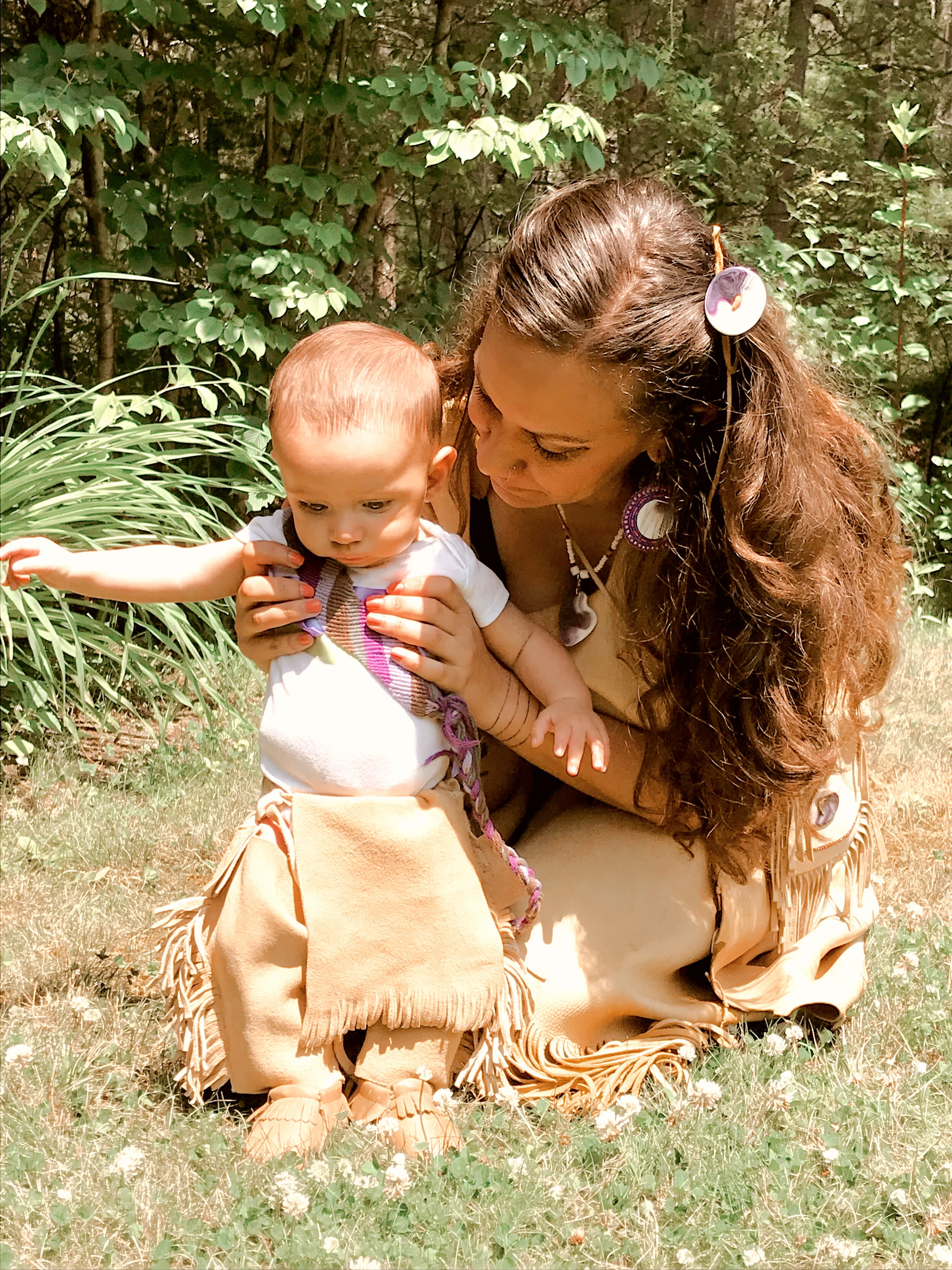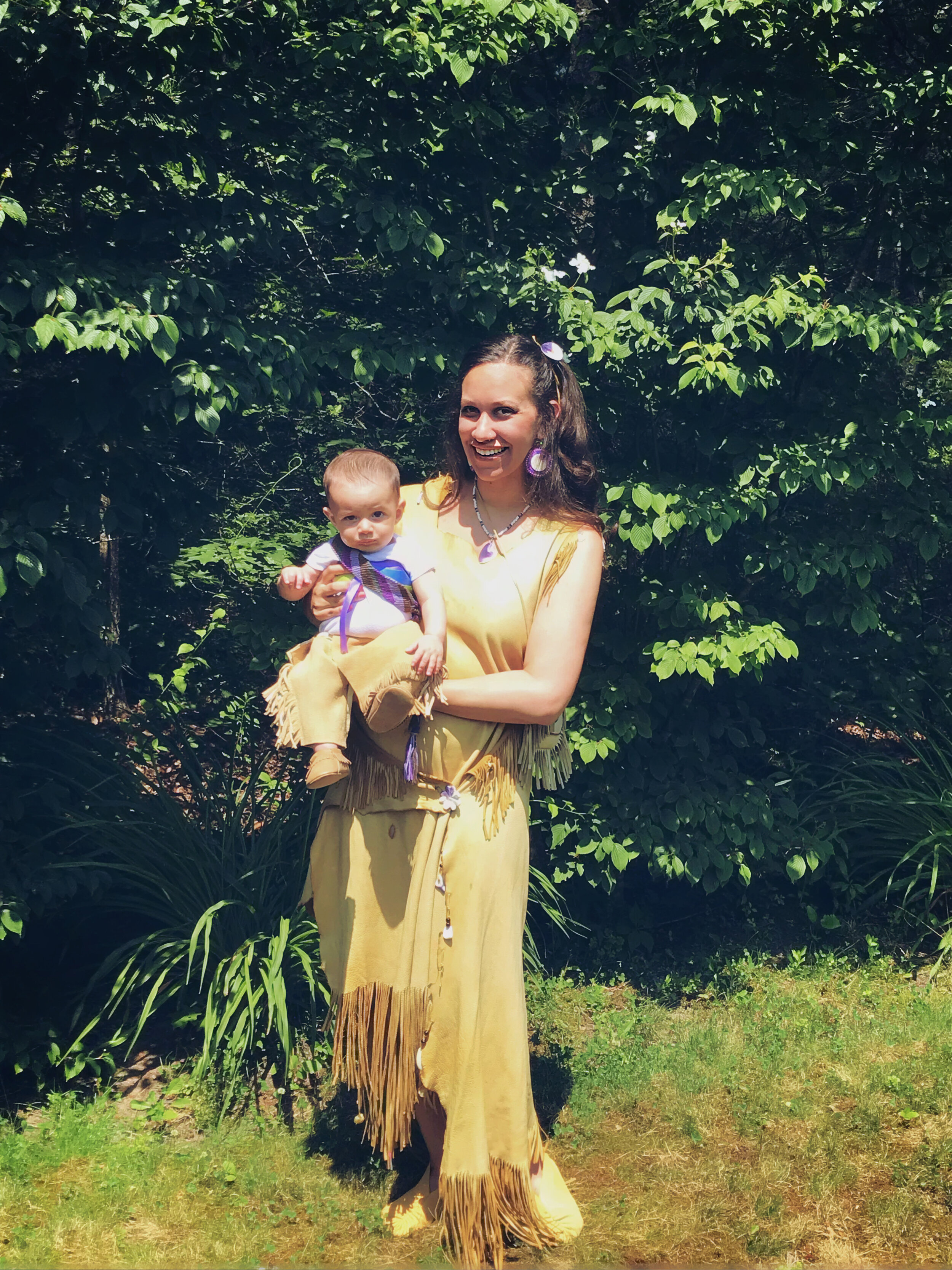Rachael Lovely joined our community last December, and over this past year, I have learned so much just sharing space with her in the front of the school. The title Administrative Assistant is such a small part of the critical role she plays in our school. I have learned that she is authentic, dedicated, hardworking, careful, balanced and beautiful inside and out. She teaches me. When I suggested she share her voice through our Views of the Bridge blog, I was thrilled when she agreed to write a piece that would not only serve to tell us more about who she is but also highlight how she honors her indigenous heritage as well as her identity as an American. (pictured above: Rachael and her son Waylan as they prepare for Waylan’s first grand entry at the annual Wampanoag powwow.)
When I share my ethnicity and culture with someone, I am usually met with a slew of questions, which I typically welcome. Around this time of year, the most common tends to be “So what do you do on Thanksgiving?” This highlights the duality of living in the 21st century as a Native American; I constantly find myself toggling between honoring my ancestry by remembering history and taking pride in being an American citizen. The two are not always compatible. But when I get questions like “What do you do on Thanksgiving?” I am given an opportunity to reconcile the two while also educating others through sharing myself.
The answer, for me, is fairly simple (though I am not the voice for all people indigenous to the United States) - I enjoy a meal with my loved ones, while reflecting both on the things I am grateful for in my life and on what historical context surrounds the day’s existence. I also like to share that Thanksgiving is but one day during Native American Heritage month, which is ultimately of greater importance to my family than Thanksgiving day. Anyhow, is this not what many Americans who are still culturally connected to their ancestry do on a regular basis- honor their American identity while still taking pride in their ethnic and cultural identity? Celebrate an American holiday in a fashion that is appropriate for their unique family? In a country where we value being a “melting pot,” we must also equally value our uniqueness, authenticity, and our diversity. It’s not always an easy balance- the equilibrium between diverse individualism and communal collectivism, yet I find myself slowly coming into this equilibrium here at Bridgeview Montessori School.
What I’ve loved so much about the emergence of this equilibrium and comfort within the Bridgeview community is that it happens organically, not forcibly. It is not comfortable being asked to participate in tokenism, and this has been my experience in many settings throughout my life… yet I am relieved to find that this has been far from my experience here at Bridgeview Montessori. This month in particular has been dotted with experiences that helped to reassure me that Bridgeview Montessori School is the type of learning community that honors tradition in a respectful way while also acknowledging history… a community where every voice is heard. From seeing the featured literature on Oona and Rebecca’s Elementary I shelves about the Wampanoag people to hearing Agnes share The Story of Cape Cod and educating Children’s House students about Wampanoag people teaching the Pilgrims how to survive on this land to being asked by Sandy and Vanessa to share in future Art classes about living as a Native American person in the 21st century… I feel that my voice has an audience of eager and willing ears in this community. I so value that Bridgeview Montessori School is a community that views individualism and collectivism as having potential for integration rather than as a dichotomy. It beautifully mirrors one of my goals in parenting which is to celebrate that my child is a dynamic being by giving him the space to find his place on a spectrum, or to find that he fits into several boxes, rather than fitting into exclusively one box or another.
In Montessori fashion, I will spend my life as a mother looking for the right opportunities to offer my son lessons around finding this equilibrium for himself. Thanksgiving is again just one day, one opportunity, for me to offer him such a lesson. But every day, whether it be an American holiday, a Wampanoag holiday or day of ceremony, or a regular old Tuesday, I will remind him that he can be both an individual and part of a community. That he can honor his ancestors and find pride in being an American. That he can hear other voices and maintain the volume of his own. Because, after all, we are surrounded by learning opportunities on a daily basis, we just have to be willing to hear the lessons.

